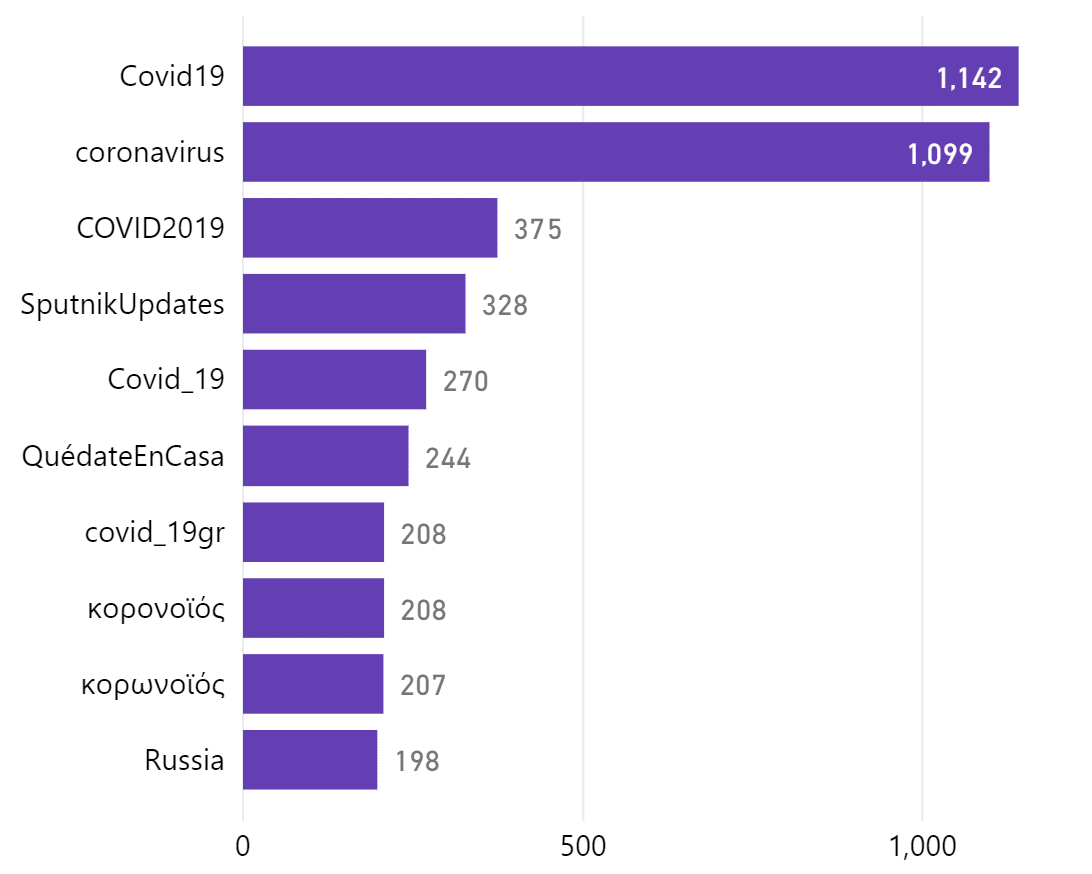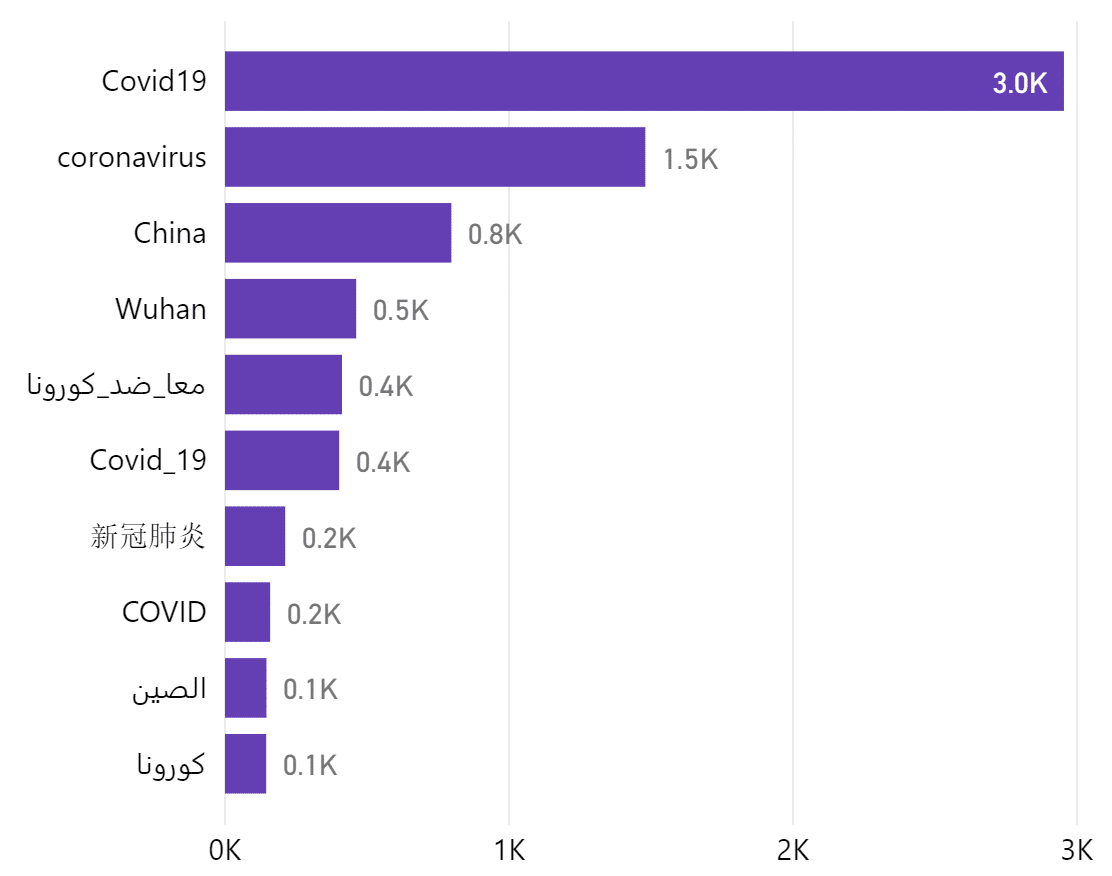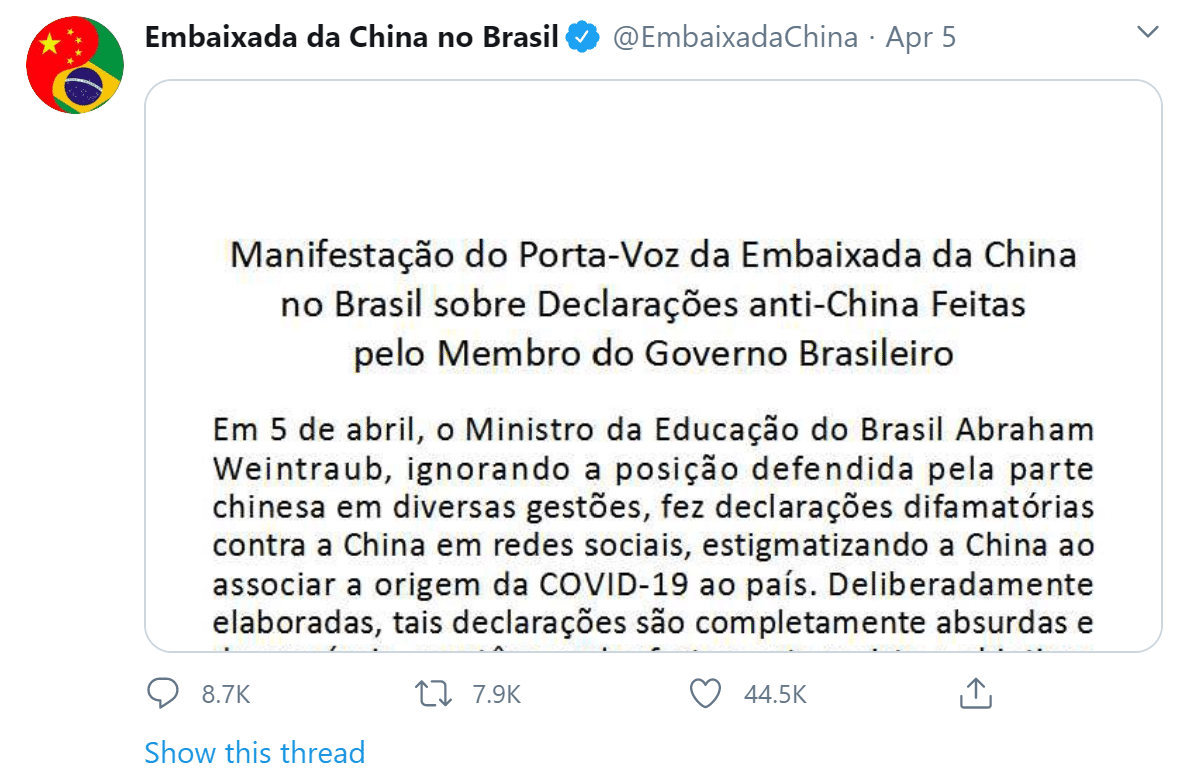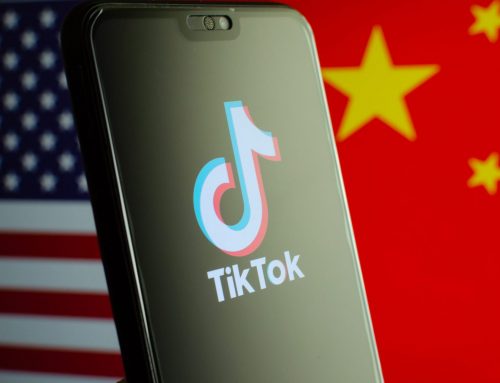Russia Toplines
As has been the case for about three months now, coverage of the coronavirus dominated the Russian media ecosystem last week. Like usual, much of the coronavirus content relayed basic news updates on various aspects of the pandemic. Other notable topics included content debunking 5G-coronavirus conspiracy theories; this is a departure from RT and Sputnik’s past 5G messaging, which consistently stoked health and safety concerns related to 5G technologies. Limited coverage of Senator Bernie Sanders’ decision to drop out of the U.S. presidential race emphasized criticisms of former Vice President Joe Biden and the Democratic establishment, while an even smaller amount of content about the Wisconsin primary highlighted public health concerns. Finally, as an addendum to last week’s report, we found evidence of Russian state-funded media and government officials insinuating that the United States intends to take advantage of the pandemic to carry out a coup in Venezuela.
China Toplines
The coronavirus was once again the top topic for the Chinese media ecosystem last week. On Twitter, controversy over a Brazilian minister’s coronavirus remarks constituted a high-profile topic. Chinese state-funded media continued messaging about China’s medical aid, disputing any claims that it carries geopolitical motivations. Some content also emphasized narratives about the return to normal life in China, contrasted with coverage of serious coronavirus outbreaks elsewhere.
Russia
Addendum to Previous Week’s Report
Over the past two weeks, there has been some evidence of Russian state-funded media and government officials seeding narratives into the Latin American information space about a possible U.S. coup attempt in Venezuela. On April 2, Russian Foreign Ministry Spokesperson Maria Zakharova made comments to the effect that the United States was using the coronavirus as cover for a coup attempt, apparently related to reports of U.S. calls for a transitional government in Venezuela. The official Russian Ministry of Foreign Affairs Twitter accounts in English and Spanish posted her comments, and a Spanish-language RT Twitter account (RT Ultima Hora) and website (RT Español) also picked up the story, with the RT Ultima Hora tweet receiving fairly substantial engagement:


“Rusia: Occidente tiene como objetivo aprovechar de la situación epidemiológica en Venezuela para realizar un golpe de estado (Russia: The West aims to take advantage of the epidemiological situation in Venezuela to carry out a coup),” RT en Español, April 2, 2020.
“The West aims to take advantage of the epidemiological situation in Venezuela to carry out a coup d’état, the Russian Foreign Ministry said Thursday. ‘Several countries are guided by the political situation, the desire to take advantage of the difficult epidemiological situation in the world and in Venezuela,’ said the agency’s spokesperson, María Zajárova, in a briefing. ‘The idea of a coup that would lead to the removal of the country’s legitimate president [Nicolás Maduro] remains in the minds of some political forces in the West,’ she said.”
Subsequently, RT and Sputnik’s Spanish-language services both covered rumors of Colombian support for a U.S. military incursion into Venezuela, reporting on the Colombian government’s denial:


“Colombia niega que apoye una intervención militar de EE.UU. a Venezuela: ¿por qué surgió la controversia? (Colombia Denies Supporting US Military Intervention to Venezuela: why did the controversy arise?),” RT en Español, April 7, 2020.
“The Colombian Defense Ministry denied on Monday that it supports a US military intervention against Venezuela, after a group of parliamentarians asserted that the minister of that portfolio, Carlos Holmes Trujillo, had made public the support of Bogotá for a measure of this nature. Last Saturday, 23 parliamentarians, along with 15 social unions, wrote a letter to President Iván Duque, in which they pointed out to Trujillo that he had openly supported a possible incursion of US troops into Venezuela, which ‘worries and deserves a statement from the Chief of State’.”
“Colombia niega que apoye intervención militar de EEUU en Venezuela (Colombia Denies Supporting US Military Intervention in Venezuela),” Sputnik Mundo, April 5, 2020.
“The Colombian Defense Ministry denied that the head of that portfolio, Carlos Holmes Trujillo, supports a US military intervention in Venezuela, and denied that there is any movement of troops on the border and even less the presence of US soldiers. in the territory for that purpose.”
These stories have overlapped with Spanish-language messaging about Russia’s medical aid to Venezuela and other criticisms of the United States’ Venezuela policies:




Russian state-funded media and government and diplomatic corps accounts:
Top 10 Hashtags — April 4-10:

The Hamilton dashboard collected about 13,000 tweets from Russian state-funded media and government Twitter accounts the week of April 4-10 (figures as of 2pm April 10). Almost 5,200 tweets mentioned “virus,” “covid,” or both, and eight of the top ten hashtags were related to the coronavirus pandemic (including #QuédateEnCasa, Spanish for “Stay at home”). The overall most retweeted tweet covered the arson of numerous U.K. 5G towers, which reportedly stemmed from 5G-coronavirus conspiracy theories:

Excluding tweets from three accounts that typically receive very high engagement regardless of topic (@actualidadrt, @rtultimahora, and @sputnik_tr), and thus may mask more widespread trends, top tweets featured additional coverage of 5G conspiracy theory consequences in the U.K., Russia-Italy solidarity, and anti-government protests in Pamplona, Spain:
Fewer than ten tweets covered the U.S. primary in Wisconsin, and they mainly emphasized the public health risks:



Websites
Russian government-funded websites:
Out of a little more than 1,500 articles collected from Russian government-funded news websites last week, about 900 mentioned “virus” in the first 200 words. Coronavirus-related narratives were less cohesive last week than the week before, but notable topics included coverage of Russia and China’s medical aid, reports about the strain the pandemic is causing in the EU, criticism of the United States’ “China blaming,” and several articles debunking 5G-coronavirus conspiracy theories. Examples of each included:
“‘Mere insinuation offends me’: Italy’s PM Conte blasts suggestion of ulterior motive behind Russian coronavirus aid,” RT, April 9, 2020.
“Prime Minister Giuseppe Conte has called any suggestion that Russia had an ulterior motive in sending coronavirus aid to Italy “an insult to the Italian government,” warning that the pandemic poses an existential threat to the EU.”
“As Italy and Spain issue dark warnings, the prospect of Covid-19 delivering a mortal blow to the EU is growing by the day,” Op-ed, RT, April 9, 2020.
“What was once idle speculation in the bars of Brussels is now mainstream – even leading Europhiles like Jacques Delors are talking openly about how the bloc’s growing divisions may lead to a dramatic break-up.”
“Targeting China over Covid-19, US & UK open Pandora’s Box … they’re responsible for a LOT MORE disasters, will THEY pay for that?” Op-ed, RT, April 9, 2020.
“The US and UK are emerging as the worst-hit nations from the Covid-19 pandemic. Instead of admitting inherent failings and facing public accountability, the narrative is to blame it all on China and even demand compensation.”
“Absolutely Unrelated: Scientists Bust Myths That 5G Equipment Helps to Spread Coronavirus,” Sputnik News, April 5, 2020.
“Bizarre 5G conspiracy theories have already led to a series of arsons that damaged or destroyed top telecom equipment. These theories are in line with other similar claims about alleged harm the new technology could pose to the human body. Scientists have stood up to defend 5G technology from a new wave of conspiracy theories spreading across social media – this time claiming that the 5G telecom masts are either spreading the novel coronavirus or facilitating the pandemic by purportedly suppressing the human immune system.”
Several articles sought to cast doubt on various claims of Russian information operations and celebrated instances in which such claims were unsubstantiated:
“Diplomat shoots down State Department claim of Russia running Covid-19 ‘disinfo’ campaign,” TASS, April 9, 2020.
“Russia received a very vague answer from the US State Department to an official demand to confirm Washington’s accusations against Moscow of spreading “disinformation” about coronavirus, spokeswoman for the Russian Foreign Ministry Maria Zakharova told a briefing Thursday . . . According to the diplomat, the American segment of the Internet deliberately popularizes various conspiracy theories over the possibility that the coronavirus was man-made, with the blame for it being particularly pinned on Russia.”
“Zakharova Mocks CNN Reports of Russia Running Troll Factory in Ghana,” Sputnik News, April 9, 2020.
“The Russian Foreign Ministry on Thursday rejected allegations that the country is running a troll factory in the western African nation of Ghana to target US voters in the run-up to the 2020 presidential election.”
“Swedish minister’s ‘Russian trolls’ fanning 5G fears turn out to be… anti-radiation activists led by local granny,” RT, April 6, 2020.
“Sweden’s digitization minister blamed a flurry of anti-5G comments on the usual suspect – “Russian trolls” – but a closer look revealed that a local granny opposed to wireless radiation was behind the campaign.”
24 articles mentioned Senator Sanders in the first 200 words, reporting or commentating on his decision to drop out of the U.S. presidential race. Opinion pieces largely lamented his decision and criticized Vice President Biden or the Democratic party, with non-opinion pieces taking a similar position. Examples included:
“Sanders jumps overboard leaving clueless Captain Biden at helm of Democrats’ burning ship,” Op-ed, RT, April 8, 2020.
“Things have never looked worse for the Democratic Party, which just lost the last semblance of mental competence as Bernie Sanders drops out of the race. With Joe Biden withering by the day, will Gov. Andrew Cuomo get the call?”
Broadcasts
Russian state-owned media:
More than three-quarters of the videos collected from Russian state-owned media on YouTube last week addressed some facet of the coronavirus. Noteworthy videos highlighted societal or government tensions in the United States, 5G coronavirus conspiracy theories, and the virus’ geopolitical impact on the EU. Examples of each included:
“COVID-19: The crisis elites have been waiting for,” RT America, April 3, 2020.
“Lee Camp, host of “Redacted Tonight” joins Rick Sanchez to discuss the whether entrenched and powerful interests will take advantage of the COVID-19 coronavirus crisis to strip Americans of their rights and further consolidate power.”
“Phone masts destroyed as 5G Covid-19 conspiracy theories spread,” RT UK, April 7, 2020.
“People have been destroying #5G towers after conspiracy theories linking the technology to #COVID19 spread across the internet.”
“‘I could see the EU fracturing into two or three,’” RT UK, April 8, 2020.
“Professor of European Law Francesco Rizzuto examines the miscommunication between #EU member states in response to #COVID19 and analyses any lasting damage this global virus could have on the Bloc.”
RT’s UK channel also put out several videos about Britons stranded abroad, an obligatory video about WikiLeaks founder Julian Assange, and continued reporting on police issues in the U.K.:
“Thin blue line: are the police abusing their new powers?” RT UK, April 6, 2020.
“The case for the woman who was put in custody for being in Newcastle station during lockdown is now overturned. With growing tension between population and police, human rights barrister Kirsty Brimelow says there needs to be a clear definition of when police go too far.”
China
Chinese state-funded media and government and diplomatic corps accounts:
Top 10 Hashtags — April 4-10:

The Hamilton dashboard collected about 13,000 tweets from Chinese state-funded media and government Twitter accounts the week of April 4-10 (figures as of 3pm April 10). At least five of the top ten hashtags were related to the pandemic. A little more than 6,700 tweets mentioned “covid,” “virus,” or both. The most-liked tweet over this period, with extremely high engagement, featured an image of the Chinese embassy in Brazil’s official statement of protest against a Brazilian minister’s statements:

Other top tweets related to COVID-19 covered China’s medical aid and declarations of support to various countries, the diplomatic spat involving the Brazilian minister’s statements, pushback against claims that China has concealed the extent of its outbreak, and the lifting of the lockdown in Wuhan. Chinese Ambassador to Brazil Yang Wanming and the Chinese embassy in Brazil accounted for more than half of the top tweets:





Websites
Chinese government-funded websites:
Almost 1,800 of the approximately 2,750 articles collected from Chinese state-funded news websites last week mentioned “covid” in the first 200 words. The top story by Facebook shares covered speculation about the timeline of the outbreak in the United States, reporting that “people are now questioning whether the virus was widespread before everyone knew about it and wondering how many people have had it already”:
“U.S. doctor with ‘flu’ in Jan tests positive for COVID-19 antibody,” CGTN, April 5, 2020.
“A post from a U.S. pediatric emergency medicine physician revealing he tested positive for novel coronavirus antibodies has stirred up wide discussions on Twitter in the last two days. The positive antibody test result suggests he had the novel coronavirus months before he even realized.”
Like the previous week, an important theme was China’s medical aid to other countries. Articles also continued to portray China as a global leader and to pushback against criticisms of China’s medical aid and response to the outbreak in Wuhan. Examples included:
“China’s medical supplies to France not on condition of 5G deployment: FM,” Global Times, April 7, 2020.
“China’s Foreign Ministry spokesperson Zhao Lijian said on Tuesday in response to reports claiming China requested France use Huawei in its 5G network in exchange for masks. US representative Mark Green was reported to have said China told France it would provide 1 billion protective face masks only if Chinese technology giant Huawei were allowed to implement its 5G capabilities in France. “I don’t know what evidence this US representative has,” Zhao said during a press conference. “His words again show that some politicians in the US can go as far as fabricating and spreading lies to jeopardize international cooperation to tackle the coronavirus, and China’s relationships with other countries.””
“Opinion: China-bashing syndrome makes coronavirus pandemic deadlier,” Xinhua, April 6, 2020.
“In a global race to save lives and control the coronavirus pandemic, some politicians and media outlets in the West seem to be headstrongly engaged in a China-bashing competition, peddling one wicked theory after another since the outbreak.”
“Smearing China won’t protect US, ministry says,” China Daily, April 10, 2020.
“Stigmatization of China will not get any backing, the Foreign Ministry said on Thursday, calling for the people of the United States to avoid copying certain US politicians who politicize the COVID-19 pandemic in an attempt to divert attention and shift blame.”
“Zhao Lijian responds to tweet questioning origin of COVID-19,” CGTN, April 7, 2020.
“Chinese spokesperson Zhao Lijian Tuesday responded to queries over earlier tweets by him that questioned the origin of the COVID-19 outbreak . . . At Tuesday’s press conference, Zhao defended his tweets by saying it was a personal response to comments made by some U.S. politicians attempting to stigmatize China. Zhao reiterated China’s consistent position regarding the origin of the virus by saying it is a scientific question that requires professional opinions.”
Broadcasts
Chinese state-owned media:
The Hamilton dashboard collected almost 100 videos posted by Chinese state-owned media on YouTube last week. Like content on other platforms, most of these videos dealt with the pandemic and its global impacts. One important theme was the idea that life in China is returning to normal, which was coupled with coverage of severe outbreaks elsewhere. Coverage of China’s medical aid abroad and messaging on China’s global leadership also continued. Examples included:
“Check out this lively local market in Guangzhou, China,” CGTN America, April 7, 2020.
“On the day that the coronavirus lockdown were lifted in Wuhan, there are internet rumors that a city in another part of China may be locked down because of COVID-19. The rumor says the alleged outbreak was caused by Africans living in Guangzhou, capital of southern China’s Guangdong Province. But CGTN sent its own reporter there and He Weiwei discovered everything is normal.”
“Wuhan ends lockdown, returns to normal life,” CGTN America, April 7, 2020.
“As coronavirus cases declined in Wuhan, China closed 16 temporary hospitals in the city. The hospitals received over 13,000 patients during the outbreak. After medical workers finished their aid missions they returned home. Officials ended the lockdown in Wuhan, after more than 10 weeks. The city is experiencing a gradual return to normal life, having recorded zero daily deaths for the first time.”
“China Railway Construction Corporation Sends Medical Team to Help Nigeria Fight COVID-19,” CCTV Video News Agency, April 8, 2020.
“China Railway Construction Corp., one of the two biggest rail construction contractors by revenue in the country, sent its first medical team with experience to Nigeria on Wednesday to help the country with the battle against the COVID-19 epidemic. The team consists of 15 members, including 12 medical workers, who specialize in such areas as infectious disease, respiratory illness, intensive care unit and other medical departments. They are scheduled to work in Nigeria for 30 days and will provide necessary medical aid and guidance for the prevention and control.”
“New York City short on supplies to deal with dead and dying from pandemic,” CGTN America, April 3, 2020.
“Temporary morgues are being set up on the streets of New York to cope with the high death toll. More than 23-hundred people have died from Covid-19 in the state. 92-thousand people have tested positive, with most of them in New York City. And the hospitals there, are being pushed to capacity.”
Finally, CGTN America put out a pair of videos on the Wisconsin primary, highlighting public health concerns associated with in-person voting and claims of related disenfranchisement:
“Wisconsin primary during COVID-19 disenfranchises communities,” CGTN America, April 7, 2020.
“African Americans are a key voting population for the 2020 presidential election, but Reverend Greg Lewis worries COVID-19 will discourage many from heading to the polls. Reverend Lewis is President of Souls to the Polls, an organization that works with minority communities to boost voter turnout and voter registration. He is also recovering from COVID-19 and says voters shouldn’t have to choose between getting sick and exercising their right to vote.”
The views expressed in GMF publications and commentary are the views of the author alone.






